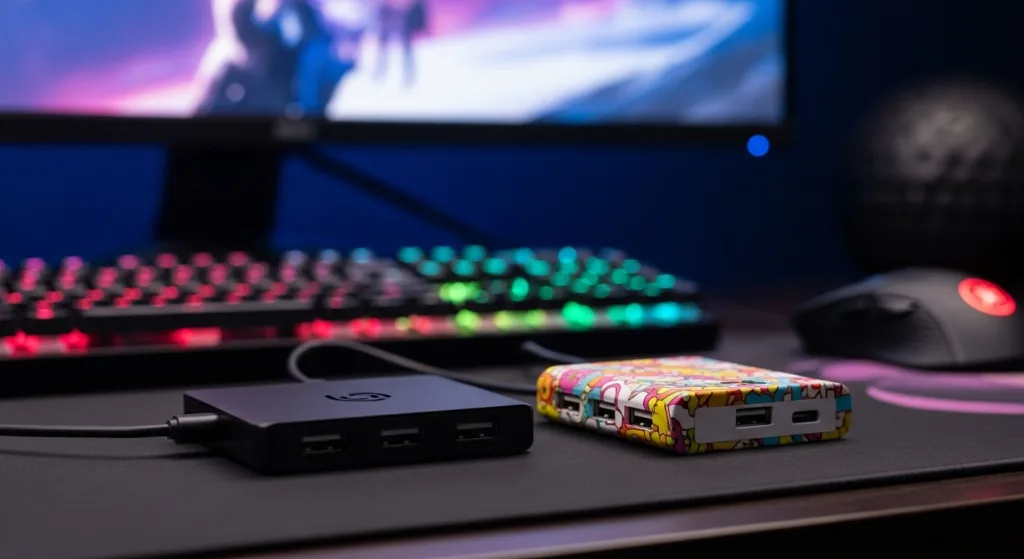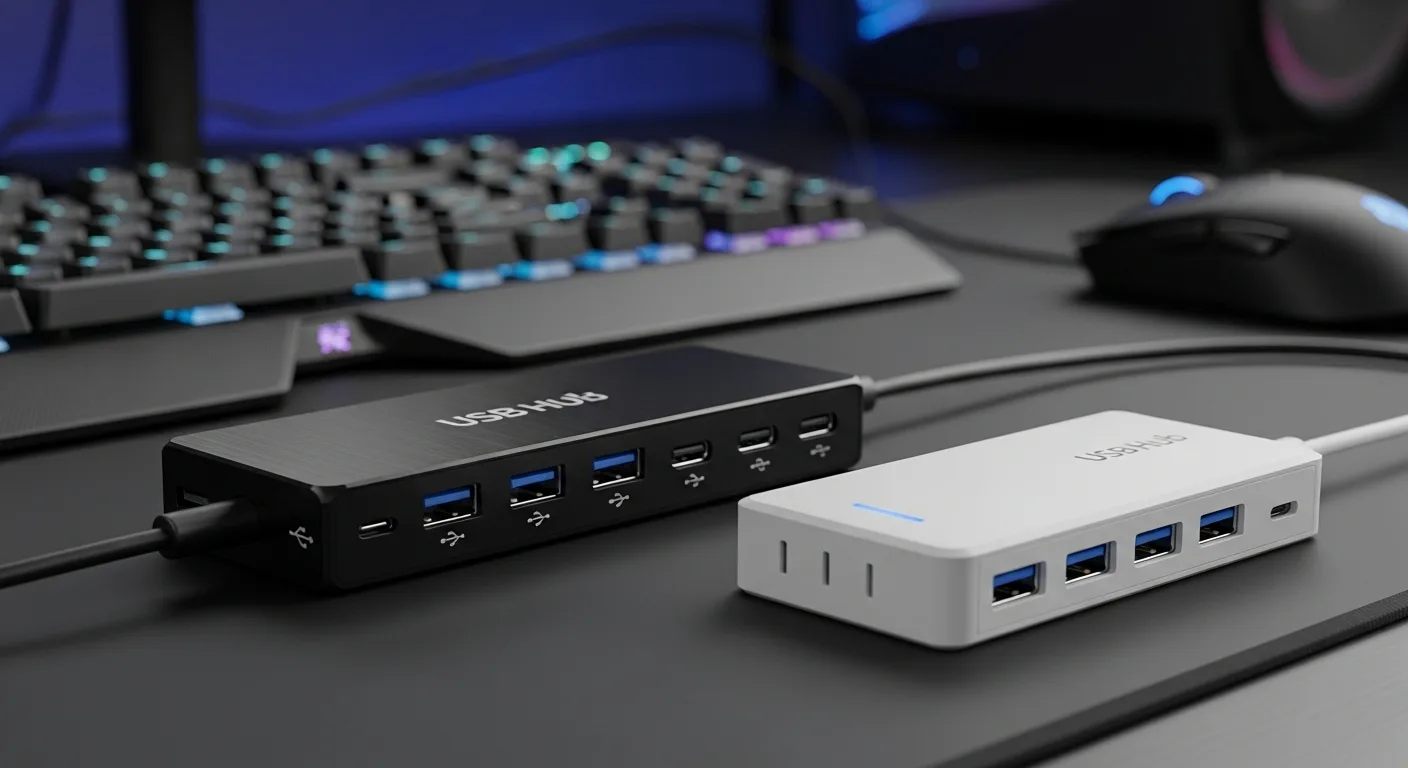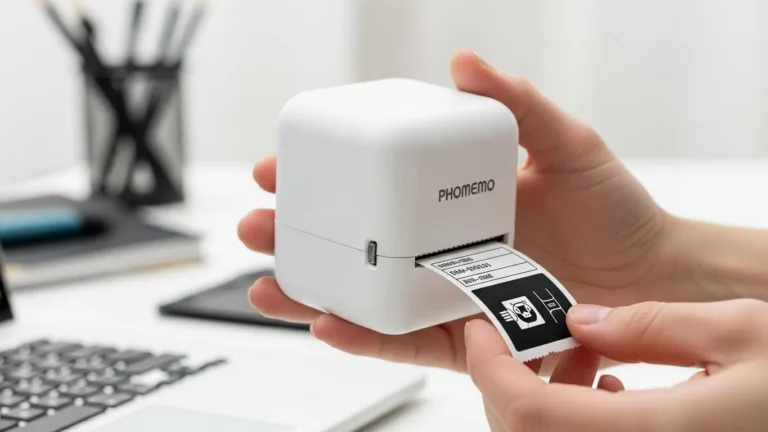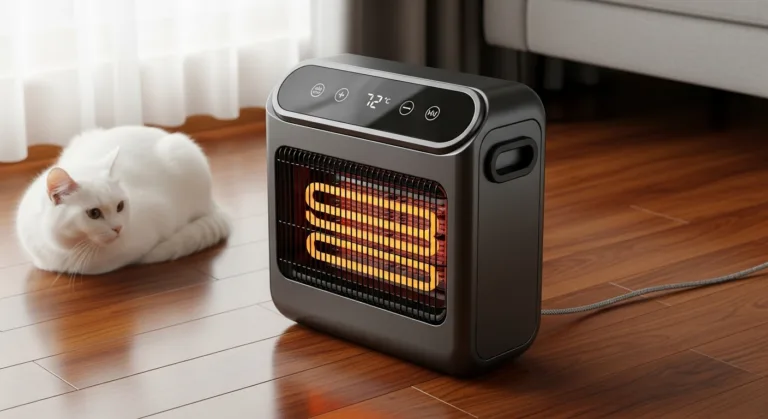In today’s hyper-connected world, the number of devices we rely on daily seems to be ever-increasing. From smartphones and tablets to external hard drives, webcams, printers, and a myriad of other peripherals, our computers are often the central hub for managing them all. The problem? Most laptops and even many desktops come with a limited number of USB ports. This is where the best USB hubs come to the rescue, transforming a single USB port into a multi-functional powerhouse.
Running out of USB ports is a common frustration, leading to a constant game of unplugging one device to make room for another. But it doesn’t have to be this way. A quality USB hub not only expands your connectivity options but can also offer faster data transfer speeds, dedicated charging ports, and even sleek designs that complement your workspace. Whether you’re a creative professional juggling multiple drives, a gamer with numerous accessories, or simply someone looking to declutter their desk, finding the right USB hub is essential.

In this guide, we’ll explore the top 10 best USB hubs available, diving into their key specifications, unique features, and what makes them stand out. Get ready to supercharge your setup and say goodbye to port scarcity!
- Why Invest in a Quality USB Hub?
- 1. SABRENT 16-Port USB 3.0 Data Hub
- 2. Acer USB Hub 4 Ports
- 3. ACASIS 16 Ports USB 3.0 Data Port
- 4. UGREEN Powered USB 3.0 Hub (7-Port)
- 5. SABRENT 10-Port 60W USB 3.0 Hub
- 6. intpw 10 Port USB 3.1 Gen 2 Hub
- 7. wenter 11-Port USB Splitter Hub
- 8. atolla 10 Ports USB Data Hub
- 9. ACASIS 16 Ports USB 3.1 Hub
- 10. LEINSIS 10-Port USB 3.2/USB C Hub
- Frequently Asked Questions (FAQ)
Why Invest in a Quality USB Hub?
The benefits of incorporating one of the best USB hubs into your setup are numerous:
- Expanded Connectivity: The most obvious benefit – turn one port into many.
- Increased Productivity: No more swapping devices; keep everything connected and ready to go.
- Faster Data Transfer: Modern hubs with USB 3.0, 3.1, or 3.2 offer significantly faster speeds than older USB 2.0 ports, saving you time when transferring large files.
- Dedicated Charging: Many powered hubs offer ports specifically designed for charging your devices, often faster than a standard computer USB port.
- Improved Organization: Consolidate your device connections to one point, reducing cable clutter.
- Port Protection: Using a hub can reduce wear and tear on your computer’s built-in USB ports.
- Portability: Smaller hubs are great for travel, ensuring you always have enough ports for your laptop on the go.
1. SABRENT 16-Port USB 3.0 Data Hub

Key Specifications:
- Ports: 16 x USB 3.0 SuperSpeed ports.
- Power: 90W dedicated power adapter (12V/7500mA) for stable operation of all ports.
- Charging: Each port can deliver up to 1.1 Amps (ideal for light charging, not rapid charging).
- Features: Individual power switches for each port with LED indicators, plug-and-play, hot-swapping support, durable aluminum shell.
- Protection: Short-circuit, over-current, over-voltage, and overheating protection.
- Compatibility: Universal (Printers, Phones, Cameras, Keyboards, Mice, Headphones, Laptops, Desktops, PS4/5).
- Design: Sleek aluminum build, anti-fingerprint finish.
- Dimensions: Approximately 9″ (L) x 2″ (W) x 1″ (H).
For users who need an extraordinary number of USB connections, the SABRENT 16-Port USB 3.0 Data Hub is an absolute beast. It’s designed for those who want to connect a vast collection of USB devices to one central, super-speed hub.
- Why Buy This?
If you’re a power user, a tech enthusiast with a multitude of gadgets, or work in an environment requiring many simultaneous USB connections (like a testing lab or a crypto mining setup), this hub offers unparalleled port density. The individual power switches are a fantastic feature for managing power consumption and device activity.
Pros
- Massive 16 USB 3.0 ports.
- Robust 90W power supply ensures stability.
- Individual power switches for each port, saving energy and prolonging device lifespan.
- Durable aluminum construction with good heat dissipation.
- Plug-and-play, no drivers needed.
- Comprehensive safety protections.
Cons
- Charging is limited to 1.1A per port, not ideal for fast-charging modern devices.
- Its larger size might not be suitable for ultra-portable setups.
2. Acer USB Hub 4 Ports

Key Specifications:
- Ports: 4 x USB 3.0 data ports.
- Additional Port: 1 x USB-C port (for auxiliary power input to the hub only; does not transfer data or charge external devices).
- Data Transfer Speed: Up to 5Gbps.
- Features: Advanced GL3510 chip for good thermal design, plug-and-play, slim and lightweight.
- Cable Length: 4 feet (120cm).
- Compatibility: Wide compatibility including Acer, XPS, PS4, Xbox, Laptops; macOS, Windows, ChromeOS, Linux.
Acer, a well-known name in computing, offers a compact and efficient 4-port USB 3.0 hub designed for everyday users looking to expand their laptop or desktop connectivity without fuss.
- Why Buy This?
This is an excellent choice for users needing a few extra high-speed ports for common peripherals like flash drives, mice, and keyboards. Its long cable and slim design make it convenient for various desk setups.
Pros
- Reliable 5Gbps data transfer speeds.
- Long 4-foot cable offers flexibility in placement.
- Slim, lightweight, and portable design.
- USB-C port for auxiliary power ensures stability when using power-hungry devices like external hard drives.
- Plug-and-play simplicity.
Cons
- The USB-C port is for powering the hub itself, not for charging devices or data transfer, which might confuse some users.
- Only 4 ports, which might be insufficient for power users.
3. ACASIS 16 Ports USB 3.0 Data Port

Key Specifications:
- Ports: 16 x USB 3.0 data and charging ports.
- Power: Includes a 12V/7.5A (90W) power adapter.
- Charging: Up to 5V/2.4A per port.
- Data Transfer Speed: Up to 5Gbps.
- Features: Individual power switches for each port with LED indicators, built-in surge protector, hot-swapping support, aluminum alloy casing.
- Compatibility: Universal compatibility with various USB devices and operating systems.
Similar to the Sabrent 16-port model, the ACASIS 16-Port USB 3.0 Hub caters to users demanding a high number of connections with the added benefit of substantial power delivery per port.
- Why Buy This?
If you need numerous ports and the ability to charge multiple devices simultaneously at a decent rate (up to 2.4A per port), this ACASIS hub is a strong contender. Its robust build and individual switches add to its appeal.
Pros
- A staggering 16 ports, all capable of data transfer and charging.
- Strong 2.4A charging capability per port.
- High-speed 5Gbps data transfer.
- Durable metal construction for better heat dissipation and stability.
- Individual switches provide excellent control.
- Surge protection for connected devices.
Cons
- Large footprint, best suited for stationary setups.
- The 90W power adapter is bulky.
4. UGREEN Powered USB 3.0 Hub (7-Port)

Key Specifications:
- Ports: 7 x USB 3.0 ports (some dedicated to data, some to data + charging).
- Power: Includes a 12V/2A external power adapter.
- Data Transfer Speed: Up to 5Gbps.
- Features: Individual on/off switches with LED indicators for each port, plug-and-play.
- Compatibility: Windows, macOS, Unix, Linux.
UGREEN offers a versatile 7-in-1 powered USB 3.0 hub that balances port count with charging capabilities, making it a great all-rounder for many users.
- Why Buy This?
This hub is ideal for users who need a moderate number of ports for both data transfer and charging. The individual switches and dedicated power adapter make it a reliable choice for a busy workstation.
Pros
- Good balance of 7 ports for data and charging.
- Reliable 5Gbps data transfer.
- Individual switches allow for better power management and device control.
- Dedicated power adapter ensures stable performance for all connected devices.
- Compact and well-built.
Cons
- Not all 7 ports may offer full charging power simultaneously if heavily loaded.
- The specific number of dedicated charging ports vs. data-only ports isn’t always clear without checking detailed specs.
5. SABRENT 10-Port 60W USB 3.0 Hub

Key Specifications:
- Ports: 10 x USB 3.0 SuperSpeed ports.
- Power: 60W power supply (12V/5A).
- Charging: Smart-charge detection, supplying up to 2.4 Amps per port for charging.
- Data Transfer Speed: Up to 5Gbps.
- Features: Individual power switches for each port with blue LED indicators, plug-and-play.
- Design: Fashionable mirrored surface with a compact design.
- Compatibility: Windows, macOS, Linux; syncs card readers, phones, hard drives, etc.
SABRENT’s 10-Port 60W USB 3.0 Hub is another excellent offering for users needing multiple high-speed connections with reliable power and device management.
- Why Buy This?
This hub is perfect for users who need a significant number of USB 3.0 ports with smart charging capabilities and individual control over each port. It’s great for decluttering a desk filled with peripherals.
Pros
- Ample 10 USB 3.0 ports.
- Powerful 60W adapter with 2.4A per port charging.
- Individual power switches enhance control and power saving.
- Sleek, compact design.
- Plug-and-play simplicity.
Cons
- Mirrored surface can be a fingerprint magnet.
- Like other larger hubs, it’s more suited for stationary use.
6. intpw 10 Port USB 3.1 Gen 2 Hub

Key Specifications:
- Data Transfer Speed: Up to 10Gbps for USB 3.1 Gen 2 ports.
- 7 x USB 3.1 Gen 2 data ports (up to 10Gbps).
- 1 x Quick Charge 3.0 port (up to 18W).
- 2 x INT-POWER fast charging ports (up to 2.4A each).
- Power: 30W (12V/2.5A) power adapter.
- Features: Aluminum unibody construction, ergonomic 32-degree angle design, temperature control (<45°C).
- Cable: Includes both USB-A to C and USB-C to C cables (4.3ft and 3.3ft respectively).
- Compatibility: Wide compatibility with USB devices and operating systems.
The intpw 10 Port Hub steps up the game by incorporating USB 3.1 Gen 2 technology, offering even faster data transfer speeds for compatible devices.
- Why Buy This?
If you work with large files and have USB 3.1 Gen 2 peripherals, this hub will allow you to take full advantage of their speed. The inclusion of Quick Charge 3.0 and dedicated fast-charging ports is a huge plus.
Pros
- Ultra-fast 10Gbps data transfer on USB 3.1 Gen 2 ports.
- Dedicated Quick Charge 3.0 port and two additional fast-charging ports.
- Premium aluminum build with an ergonomic design.
- Excellent heat dissipation and temperature control.
- Includes versatile cabling options.
Cons
- To achieve 10Gbps, both the host computer and the peripheral must support USB 3.1 Gen 2.
- The 30W power adapter might feel slightly underpowered if all charging ports are maxed out while also transferring data heavily.
7. wenter 11-Port USB Splitter Hub

Key Specifications:
- 10 x USB 3.0 data ports.
- 1 x USB fast charging port (red, up to 2.4A).
- Data Transfer Speed: Up to 5Gbps for USB 3.0 ports.
- Power: 36W (12V/3A) power adapter.
- Features: Individual on/off switches for each of the 10 data ports with blue LED indicators, main power switch with red LED.
- Cable Length: 100cm (3.3ft) USB cable, 120cm (4ft) power cable.
- Compatibility: Universal.
The wenter 11-Port USB Splitter Hub offers a high port count with a focus on data transfer and basic charging, all managed with individual switches.
- Why Buy This?
This is a solid choice for users needing many data ports with the convenience of one dedicated fast-charging port. The individual switches are a practical addition for managing a large number of connected devices.
Pros
- Generous 10 data ports plus one dedicated charging port.
- 5Gbps data transfer speed.
- Individual switches for data ports and a main power switch.
- Sufficient power with the 36W adapter for stable operation.
Cons
- Only one dedicated fast-charging port.
- The design is functional but might not be as aesthetically refined as some others.
8. atolla 10 Ports USB Data Hub

Key Specifications:
- Ports: 10 x USB 3.0 data ports.
- Data Transfer Speed: Up to 5Gbps.
- Power: 30W (12V/2.5A) power adapter.
- Features: Individual on/off switches for each port with blue LED indicators, over-voltage and over-current protection.
- Compatibility: Universal for keyboards, mice, printers, hard drives, etc.
The atolla 10-Port USB Data Hub focuses on providing a large number of high-speed data ports with individual control, powered by a robust adapter.
- Why Buy This?
If your primary need is a multitude of reliable, individually controlled USB 3.0 data ports, and charging is a secondary concern, this atolla hub is a very practical solution. Its safety features are also a plus.
Pros
- 10 high-speed USB 3.0 ports.
- Individual switches for convenient port management.
- Stable power supply with the 30W adapter.
- Built-in safety features (over-voltage/current protection).
- Plug-and-play.
Cons
- No dedicated fast-charging ports; charging capabilities will be standard USB power.
- Design is fairly standard.
9. ACASIS 16 Ports USB 3.1 Hub

Key Specifications:
- Ports: 16 x USB 3.1 Gen 2 ports.
- Data Transfer Speed: Up to 10Gbps per port.
- Power: High-power 96W (12V/8A) adapter.
- Features: Individual power switches for each port with LED indicators, aluminum alloy case for heat dissipation, built-in surge protector, hot-swapping.
- Charging: Can charge devices (e.g., phones, tablets), though specific amperage per port under load isn’t detailed, the 96W supply is substantial.
- Compatibility: Universal.
ACASIS makes another appearance with a 16-port hub, this time featuring ultra-fast USB 3.1 Gen 2 (10Gbps) speeds, targeting users with high-performance needs.
- Why Buy This?
This is for the ultimate power user or professional who needs a massive number of the fastest USB-A ports available. If you’re dealing with large datasets, 4K video editing, or other bandwidth-intensive tasks across multiple devices, this hub is built for you.
Pros
- An incredible 16 ports, all supporting 10Gbps USB 3.1 Gen 2 speeds.
- Extremely powerful 96W adapter ensures stable operation and charging.
- Individual switches for granular control.
- Durable aluminum casing for excellent heat management and longevity.
- Comprehensive safety features.
- Great for organizing a complex setup.
Cons
- Very large and requires significant desk space.
- The price point will be higher due to the advanced technology and port count.
- To get 10Gbps, host and device must support it.
10. LEINSIS 10-Port USB 3.2/USB C Hub

Key Specifications:
- Ports: Total 10 ports:
- 3 x USB-A 3.2 ports (10Gbps).
- 2 x USB-C 3.2 ports (10Gbps).
- 5 x USB-A 3.0 ports (5Gbps).
- Charging: BC 1.2 charging ports (5V/2.4A).
- Data Transfer Speed: Up to 10Gbps (USB 3.2) and 5Gbps (USB 3.0).
- Power: 48W (12V/4A) DC power supply.
- Features: Individual on/off switches with LED indicators, aluminum housing, plug-and-play.
- Cable: Includes a 3.3ft USB-A/USB-C cable.
- Compatibility: M1 Mac Mini, MacBook, iMac, XPS, Surface Pro, etc.
The LEINSIS 10-Port Hub is a forward-thinking device, offering a mix of USB-A and USB-C ports, all leveraging the fast USB 3.2 standard, along with dedicated charging.
- Why Buy This?
This hub is perfect for users with a mix of modern USB-C and traditional USB-A devices who demand high-speed data transfer and convenient charging. It’s a great way to future-proof your connectivity.
Pros
- Excellent mix of high-speed USB-A and USB-C 3.2 (10Gbps) ports.
- Additional USB 3.0 ports for broader compatibility.
- Dedicated charging capabilities (BC 1.2).
- Individual switches for easy device management.
- Durable aluminum construction with a sleek design.
- Good power supply for stability.
Cons
- The exact port configuration (number of 10Gbps vs 5Gbps) could be slightly confusing based on different visual cues in the source.
- Achieving full 10Gbps requires compatible host and devices.
Frequently Asked Questions (FAQ)
What’s the difference between USB 3.0, USB 3.1, and USB 3.2?
USB 3.0 (now USB 3.2 Gen 1): Offers speeds up to 5Gbps.
USB 3.1 (now USB 3.2 Gen 2): Offers speeds up to 10Gbps.
USB 3.2 Gen 2×2: Offers speeds up to 20Gbps (less common in consumer hubs currently).
It’s important to note that the naming conventions have become confusing. Essentially, look for the “Gen” number and the speed rating.
Do I need a powered USB hub?
Unpowered (Passive) Hubs: Draw power directly from the host computer. They are suitable for low-power devices like flash drives, mice, and keyboards.
Powered (Active) Hubs: Come with their own AC adapter. They are necessary for connecting multiple power-hungry devices like external hard drives, webcams, printers, or for reliable charging. Most hubs with many ports are powered.
Can all USB hubs charge devices effectively?
No. While all USB ports provide some power, only powered hubs with dedicated charging ports (often compliant with standards like BC 1.2 or Quick Charge) can charge devices like smartphones and tablets efficiently and quickly. Unpowered hubs or data-only ports on powered hubs will charge very slowly, if at all.
Are most USB hubs plug-and-play?
Yes, the vast majority of modern USB hubs are plug-and-play, meaning they don’t require any special drivers to be installed on Windows, macOS, or Linux systems.
Will using a USB hub slow down my devices?
A quality USB hub should not noticeably slow down your devices, especially if it’s a powered hub with sufficient bandwidth for all connected peripherals. However, if you connect many high-bandwidth devices to an unpowered or underpowered hub, you might experience performance issues or disconnections. The hub shares the bandwidth of the single port it’s connected to on your computer.
Choosing the best USB hub for your needs can dramatically improve your workflow and reduce daily tech frustrations. Consider the number and type of ports you require, your data transfer speed needs, and whether charging is a priority. With the right hub, you’ll unlock a new level of connectivity and convenience for all your devices.
Happy connecting!











[…] most up-to-date information. As an Amazon Associate, I earn from qualifying purchases.Also read: Best USB Hubs You […]